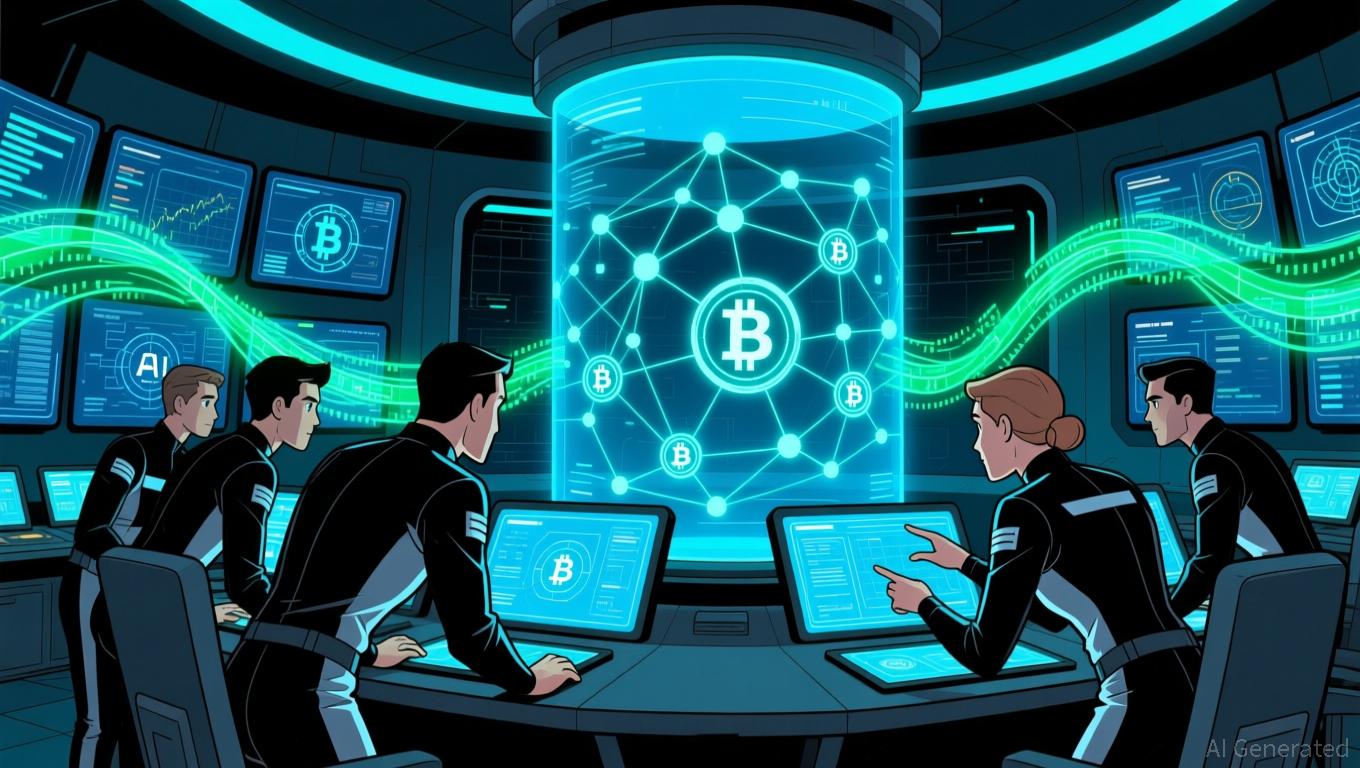Bitcoin Updates: Major Institutions Increase Bitcoin Holdings During Price Drops While Solana ETFs Resist Market Downturn: Opportunity or Crisis?
- Institutional investors and presale participants are buying dips in Bitcoin , Solana , and BNB as market volatility creates accumulation opportunities. - Hyperscale Data (GPUS) boosted its Bitcoin treasury to $70.5M (77% of market cap), aiming to expand to $100M via dollar-cost averaging. - Solana ETFs defied broader outflows with $568M net inflows, contrasting Bitcoin's $3.7B ETF exodus and signaling shifting institutional risk appetite. - Market dynamics hinge on Fed policy, ETF stabilization, and tech
Institutional Investors Seize Opportunities Amid Crypto Market Swings
Recent turbulence in the cryptocurrency sector has opened doors for both institutional players and early-stage investors. Many are taking advantage of price drops to strengthen their holdings in major assets such as Bitcoin (BTC), Solana (SOL), and BNB. Although overall market sentiment remains wary, calculated investments and technical recoveries are fueling renewed momentum, especially within digital asset reserves and exchange-traded funds (ETFs).

Hyperscale Data Leads Bitcoin Accumulation
Hyperscale Data (GPUS), a company specializing in AI-driven data centers, has become a prominent figure in the ongoing accumulation of Bitcoin. The firm recently revealed that its Bitcoin holdings—including both direct purchases and allocated cash—totaled $70.5 million as of November 23, 2025. This amount represents 77% of the company’s total market value and includes 382.9384 BTC, with 45.45 BTC added in just the final week before the report. Hyperscale Data is targeting a $100 million Bitcoin treasury, employing a dollar-cost averaging approach to manage market volatility. Meanwhile, CleanSpark (CLSK) reported a significant turnaround, posting a profit of $1.12 per share for fiscal year 2025 after previous losses, thanks to its combined focus on Bitcoin mining and AI infrastructure.
Bitcoin Faces Headwinds, Solana Defies the Trend
Despite these positive developments, Bitcoin has encountered notable challenges. Its Sharpe Ratio has hovered near zero, and the Bull-Bear Structure Index has dropped to -36%, indicating weaker risk-adjusted returns. Nevertheless, historical trends suggest that such downturns often precede market recoveries. Institutional sentiment remains cautious, with Bitcoin ETFs experiencing $3.7 billion in outflows and Ethereum ETFs seeing $1.64 billion withdrawn in November. In contrast, Solana (SOL) has attracted $568 million in net ETF inflows since October, including a record $58 million in a single day. This strong performance has established SOL as a leading alternative, buoyed by institutional tokenization initiatives and steady inflows, even as its price fell by 30% over the month.
Shifting ETF Dynamics and Market Outlook
The divergence in ETF activity highlights changing risk preferences among investors. While Bitcoin funds are under redemption pressure, Solana’s ETFs have consistently drawn new capital, pushing assets under management close to the $1 billion mark. Analysts credit this to Solana’s ongoing network improvements and growing institutional interest, though technical signals indicate the token is still undergoing a correction. Bitcoin’s future trajectory will depend on broader economic factors, such as the Federal Reserve’s upcoming rate decision and the stabilization of ETF flows. A shift toward more accommodative monetary policy or renewed institutional buying could revive risk appetite, but a drop below $84,000 may trigger further declines.
Disclaimer: The content of this article solely reflects the author's opinion and does not represent the platform in any capacity. This article is not intended to serve as a reference for making investment decisions.
You may also like
How a Query from an Office Supplies Specialist Transformed a $12 Billion Trucking Approach
- A non-trucking board member's question prompted Ryder System to shift focus from leasing to targeting 80-85% of companies owning their own trucks. - The strategic pivot aligns with growing demand in long-haul freight driven by e-commerce, trade agreements, and tech innovations like IoT fleet management. - Industry consolidation and sustainability trends, including electric trucks, are reshaping competition as firms expand specialized services like temperature-controlled logistics. - Ryder's experience hi

Ethereum News Update: Disorder or Planning? Apeing's Early Sale Breaks the Typical Meme Coin Mold
- Apeing ($APEING) emerges as a structured meme coin contender with a verified whitelist presale offering 10,000% projected gains, contrasting chaotic market norms. - Bitcoin and Ethereum show mixed recovery signals while Pepe ($PEPE) and Bonk ($BONK) dominate headlines amid growing institutional interest in meme coins. - Apeing's hybrid model combines meme virality with AI-driven utilities and audited infrastructure, drawing comparisons to Ethereum's blockchain evolution. - Risks persist due to market vol
Bitcoin Updates: IMF Warns of Widespread Risks Amid Growing Popularity of Tokenized Finance
- IMF highlights tokenized finance's efficiency gains but warns of systemic risks like smart contract interdependencies and liquidity vulnerabilities. - Upcoming Chainlink ETFs signal growing institutional adoption, with Grayscale and Bitwise advancing regulated exposure to $100B+ oracle network assets. - Analysts predict over 100 new crypto ETFs in six months, but XRP's 18% price drop underscores market volatility despite regulatory approvals. - IMF anticipates regulatory frameworks to address cross-platf

South Korea's Revamped AML Framework: Is It Possible to Balance Security with Innovation?
- South Korea's FSC overhauls AML rules to tighten crypto transaction oversight, targeting transfers under $680 and expanding pre-emptive freezes. - The crackdown follows Upbit's $30M hack linked to North Korea, prompting tax authority raids and blockchain tracking for evasion cases. - AI-powered monitoring flagged 200 suspicious accounts in 2 months, balancing automation with manual audits to detect illicit patterns. - Global enforcement remains fragmented as South Korea pushes stricter VASP registration,
